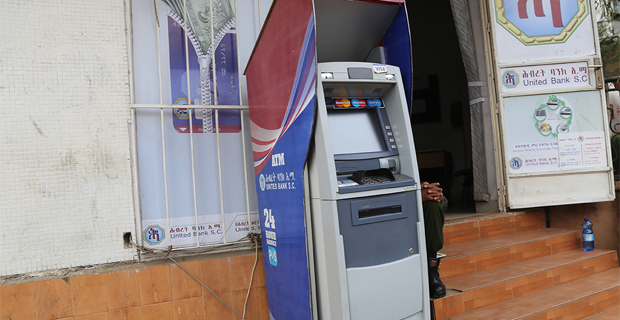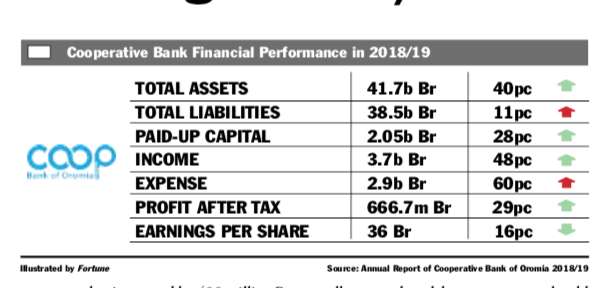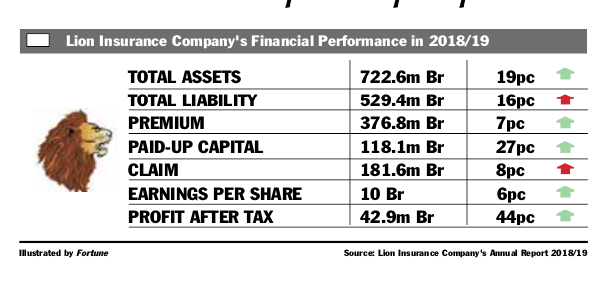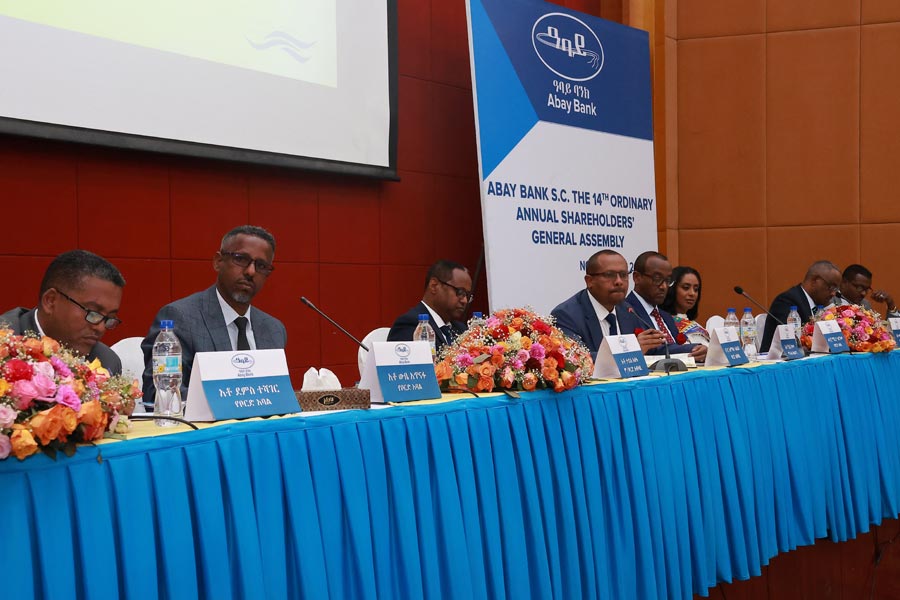
Commentaries | Dec 04,2021
Net profit of United Insurance Company (UNIC), one of the oldest insurance firms, fell by 14pc to 106.6 million Br in the last financial year. Earnings per share also dropped by 167 Br.
The decline is due to last year’s one time profit increase from the firm selling its share in Raya Brewery, according to Mulualem Birhane, board chairperson of UNIC.
The preceding year’s profit was inflated mainly due to a gain on disposal of equity investment amounting to 54 million Br, the revenue generated after the company sold the shares it had in Raya Brewery to BGI Ethiopia.
Excluding the gain on disposal of equity investments, the performance of UNIC has shown improvements, according to Abdulmenan Mohammed, a financial statement analyst with close to two decades of experience.
Underwriting income of the insurance firm has increased by 44pc to 173.5 million Br. UNIC's gross written premiums also reached 533.6 million Br, showing a 13pc increase.
"This is a reasonable increase," said Abdulmenan.
Out of the total written premium, the company retained 23pc of it, spotting a small reduction, and transferred the remainder to reinsurers.
The net claims UNIC paid to clients also declined by seven percent to 226.9 million Br.
"The reduction had contributed to improved performance of United's main area of business," said Abdulmenan.
In the reported period, UNIC worked on claim management, according to Meseret Bezabih, CEO of the company.
"We've identified policies with risk, and we adjusted premiums," she told Fortune.
Direct expenses of the firm have also spiked by 5.4pc to 27.3 million Br, while the commissions it earned from reinsurers slightly dropped by two percent to 32.9 million Br.
Revenues from investment activities have positively contributed to the firm's profitability. Interest on savings increased by 30pc to 46.1 million Br, while dividend income went up by 36pc to 14.8 million Br. The company's revenue from rent also increased by 69pc to 17.2 million Br.
United put a considerable amount of its resources into income-generating investments. It invested 397.2 million Br in time deposits, an increase of 19pc, and 298.3 million Br in investment property, an increase of 66.9pc. It also invested 134.9 million Br in shares.
“The management should be appreciated for this," Abdulmenan said.
The revenue increase of the company is accompanied by expense expansion. It's expenses rose by 32pc to 137.2 million Br.
"The management of the company should closely monitor them," commented Abdulemenan.
Salary raises made to employees have contributed to the growth of expenses, according to Meseret.
"We made salary raises to motivate our employees," she said, "but we still work in controlling expenses including claims."
United's assets spiked by 14pc to 1.5 billion Br. However, its liquidity declined in value and relative terms. Its cash and cash equivalents decreased by 16.6pc to 34.6 million Br, while the ratio of cash and bank balances to total assets fell to 2.3pc from 3.1pc.
"United was operating under tight liquidity," said Abdulmenan, "and the management should be careful when working with such tight liquid resources."
The company was operating with tight liquidity by design, according to Meseret.
She argues that holding cash at a high inflation rate has high risk. Last year's average headline inflation rate stood at 12.6pc, according to data from the Central Statistical Agency.
"So we were investing more money in the businesses that generate revenue," she told Fortune.
In the past couple of years, the company had invested 115 million Br and 140 million Br to acquire buildings in Bole and Qality districts, respectively. It also built a headquarters with 300 million Br.
"All these investments have already started generating revenues," she said. "This develops the capability of tackling the liquidity ratio."
UNIC also increased its paid-up capital by 50pc to 375.6 million Br. Its capital and non-distributable reserves reached 444.7 million Br, accounting for 29.3pc of its total assets.
"This shows that United is a well-capitalised company," said Abdulemenan. "It should use its strong capital efficiently, and further capitalization will undermine the returns of shareholders."
The management of the company is also waiting for the approval of a new directive about investment in the insurance industry to design a long-term strategic plan, according to Meseret.
The central bank is in the process of amending directives to raise insurance company investment ceilings on acquisition and the construction of buildings and to ease the maximum liquidity level imposed.
PUBLISHED ON
Nov 30,2019 [ VOL
20 , NO
1022]

Commentaries | Dec 04,2021

Radar | Nov 20,2023

Fortune News | Apr 13,2020

Radar | May 04,2024

Fortune News | Mar 21,2020

Exclusive Interviews | Jan 05,2020

Fortune News | Mar 14,2020

Commentaries | Jan 07,2022

News Analysis | Nov 25,2023

Viewpoints | Oct 19,2019

Dec 22 , 2024 . By TIZITA SHEWAFERAW
Charged with transforming colossal state-owned enterprises into modern and competitiv...

Aug 18 , 2024 . By AKSAH ITALO
Although predictable Yonas Zerihun's job in the ride-hailing service is not immune to...

Jul 28 , 2024 . By TIZITA SHEWAFERAW
Unhabitual, perhaps too many, Samuel Gebreyohannes, 38, used to occasionally enjoy a couple of beers at breakfast. However, he recently swit...

Jul 13 , 2024 . By AKSAH ITALO
Investors who rely on tractors, trucks, and field vehicles for commuting, transporting commodities, and f...

Jun 28 , 2025
Meseret Damtie, the assertive auditor general, has never been shy about naming names...

Jun 21 , 2025
A well-worn adage says, “Budget is not destiny, but it is direction.” Examining t...

Jun 14 , 2025
Yet again, the Horn of Africa is bracing for trouble. A region already frayed by wars...

Jun 7 , 2025
Few promises shine brighter in Addis Abeba than the pledge of a roof for every family...